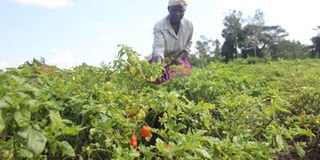New body to regulate chillies, pepper exports

A farmer picks ripe hot pepper from her garden. Horticultural products are source of income for the country, exporters as well as smallholder farmers. Photo by Abubaker Lubowa
In an effort to win back the European market, chillies and hot pepper producers and exporters have formed a body to oversee and regulate the sub-sector.
In an interview with Seeds of Gold, John Bosco Lwere, trade promotion officer, Uganda Export Promotion Board (UEPB) said: “The new body called Uganda Fruits and Vegetable Exporters and Producers Association is one of the recommended measures to improve monitoring, compliance and information sharing.”
Problem
Last year, a notification was issued from Brussels following increased interceptions of horticultural exports from Uganda because of failure to comply with phytosanitary requirements.
The rejected commodities were mainly hot pepper and chillies. Traces of live insects (false coding moth) had been detected.
Ideally, certification is issued to indicate that consignments of plants, plant products or other regulated articles meet specified requirements.
New board
The formation of an all-inclusive body, spearheaded by UEPB, saw the election of Thomas Yiga (chairperson), Micheal Owino (vice chairperson), Jonan Mukisa (treasurer), Hasifah Tushabe (secretary).
Committee members are James Kanyije, Piet Diang, Edson Nkata, Shafik Kawooya and Matthew Katongole.
Training
Also, to meet EU phytosanitary requirements, UEPB and ministry of Agriculture conducted trainings for exporters and producers.
Dr Okasai Opolot, commissioner, crop protection, at the ministry, said they have instituted a self-ban that is being lifted on a case-by-case basis.
This is after compliance with requirements on the part of exporters and their producers (source farms).
However, to prepare hot pepper producers better and educate them on the false coding moth and other common pests and diseases, UEPB with the support of QUISP programme under ministry of Trade, organized on-site trainings on pest management and proper pesticide use.
The first training was held in December 2014, in Garuga, off Entebbe road. A total of 143 farmers from several producing areas in and around Kampala (Mpigi, Wakiso, and Kampala and Buikwe) attended.
However, the second training planned for the same month in Mubende, for producers from Mubende, Kasese and surrounding areas, was postponed.
This programme was concluded with the training of pack house managers and agronomists attached to various export houses or employed by exporters to provide support to outgrowers.
Horticultural products are a non-traditional export for Uganda. They have improved the well-being of many smallholder farmers as a source of livelihood for them.




